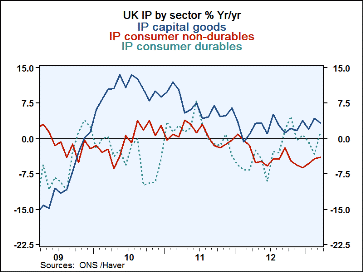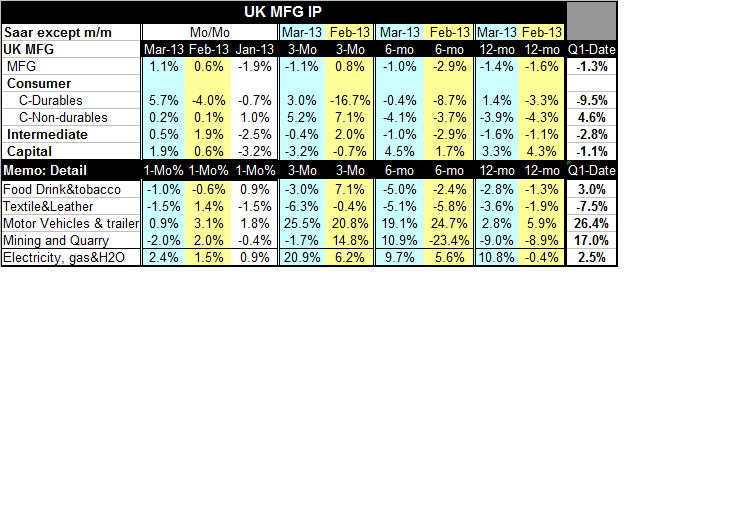 Global| May 09 2013
Global| May 09 2013UK IP Perks Up, but Still Drops in Quarter
Summary
Industrial production in the UK rose by 1.1% in March, building on a gain of 0.6% in February, and struggling to make a net gain compared to January's 1.9% drop. In March output saw increases for consumer durable goods, consumer [...]
 Industrial production in the UK rose by 1.1% in March, building on a gain of 0.6% in February, and struggling to make a net gain compared to January's 1.9% drop. In March output saw increases for consumer durable goods, consumer nondurable goods, intermediate goods and capital goods. Nondurable goods have seen output increase for four months in a row; the last two months, however, were very small increases. Consumer durable goods output is up strongly after two months of declines. Intermediate goods output is up for two months running after a sharp decline in January. Capital goods output is up for two months in a row also after sharp drop in January.
Industrial production in the UK rose by 1.1% in March, building on a gain of 0.6% in February, and struggling to make a net gain compared to January's 1.9% drop. In March output saw increases for consumer durable goods, consumer nondurable goods, intermediate goods and capital goods. Nondurable goods have seen output increase for four months in a row; the last two months, however, were very small increases. Consumer durable goods output is up strongly after two months of declines. Intermediate goods output is up for two months running after a sharp decline in January. Capital goods output is up for two months in a row also after sharp drop in January.
For the quarter to date UK manufacturing output is declining at 1.3% annual rate; the decline is led by consumer durables output which is falling in a 9.5% annual rate; intermediate goods output is falling at a 2.8% annual rate. Capital goods output in the first quarter is dropping at a 1.1% annual rate. Only consumer nondurables output is rising in the first quarter and that's at a 4.6% annual rate.
Recent data show that the UK economy has been skirting another negative GDP number in the first quarter. The PMI index for manufacturing rose in April to 49.81 from 48.56 in March. At the end of the first quarter, the PMI reading was 48.56 indicating that manufacturing was contracting although the manufacturing index had improved slightly during the course of the quarter. Still we find that the quarter is will find manufacturing industrial production is in fact declining.
Similarly the services index improved in the UK in April to 52.94 from 52.41 in March. Services index shows at the end of the quarter of the service sector is expanding and shows that the services barometer improved on balance during the course of quarter. The construction sector has continued to advance in terms of the PMI reading but by April the sector still was indicating a small contraction in actual output. Moreover, at the end of the first quarter the construction PMI at 47.16 indicates sector contraction and yet ongoing improvement during the course of the quarter.
Looking at some key sectors motor vehicles sector has been quite strong putting several months of output increases in a row together with sector output rising at a 26.4% annual rate first quarter. Also strong was mining and quarrying where output is increasing at a 17% annual rate in in the quarter. Food and drink with the quarterly annualized rate of 3% is putting a solid quarter. Textile and leather goods output is declining at a 7.5% annual rate in the first quarter.
On balance UK economy is still fighting some difficulties but the manufacturing sector is improving and the services industry seems to be expanding and appears to be on more solid footing.

Robert Brusca
AuthorMore in Author Profile »Robert A. Brusca is Chief Economist of Fact and Opinion Economics, a consulting firm he founded in Manhattan. He has been an economist on Wall Street for over 25 years. He has visited central banking and large institutional clients in over 30 countries in his career as an economist. Mr. Brusca was a Divisional Research Chief at the Federal Reserve Bank of NY (Chief of the International Financial markets Division), a Fed Watcher at Irving Trust and Chief Economist at Nikko Securities International. He is widely quoted and appears in various media. Mr. Brusca holds an MA and Ph.D. in economics from Michigan State University and a BA in Economics from the University of Michigan. His research pursues his strong interests in non aligned policy economics as well as international economics. FAO Economics’ research targets investors to assist them in making better investment decisions in stocks, bonds and in a variety of international assets. The company does not manage money and has no conflicts in giving economic advice.
More Economy in Brief
 Global| Feb 05 2026
Global| Feb 05 2026Charts of the Week: Balanced Policy, Resilient Data and AI Narratives
by:Andrew Cates






